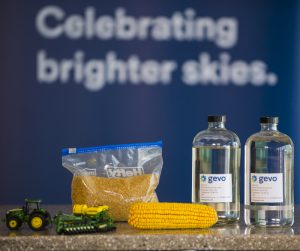
An Alaska Airlines jet is fueled with renewable Gevo biofuel on Tuesday June 7, 2016, in advance of two demonstration flights powered by the first alcohol-to-jet fuel made from sustainable U.S. corn.
An Alaska Airlines commercial plane flew through the skies yesterday powered by Gevo’s renewable alcohol to jet fuel that meets all ASTM requirements (D7566). One flight began in Seattle and flew to San Francisco International Airport then on to Ronald Reagan Washington National Airport. While ASTM has approved up to a 30 percent biojet fuel blend, the Alaska airlines flights used a 20 percent fuel blend.
“Flying a commercial flight with our jet fuel made from renewable resources has been a vision of ours for many years, and it has taken many years of work to get this far,” said Pat Gruber, Gevo CEO. We believe our technology has the potential to be the lowest-cost, renewable carbon-based jet fuel, given the efficacy of our technology. We look forward to moving forward with Alaska, and others in the airline industry, to make renewable jet fuel widely successful as a product that substitutes for fossil fuels, and ultimately helps to reduce carbon.”

Sustainably grown U.S. corn is converted into renewable alcohol-to-jet fuel by Gevo, Inc.
Ingrid Barrentine/Alaska Airlines
According to the International Civil Aviation Organization, the airline industry contributes about 2 percent of total worldwide GHG emissions. The organization estimates that air travel worldwide will double in passengers and flights by 2030 significantly increasing jet fuel consumption and GHG emissions.
“Alaska is committed to doing its part to reduce its carbon emissions and advancing the use of alternative jet fuels is a key part of our emission reduction strategy. Gevo’s jet fuel product is an important step forward, in that it has the potential to be scalable and cost effective, without sacrificing performance,” said Joseph Sprague, Alaska Airlines senior vice president of Communications and External Relations.
Alaska Airlines has been a leader in moving to a more sustainable industry both on the ground and in the air. Recently the airline partnered with Boeing and the Port of Seattle on a $250,000 Biofuel Infrastructure Feasibility Study for Seattle-Tacoma International Airport.

